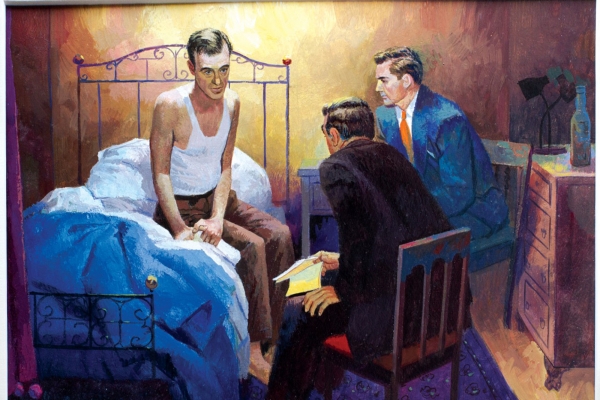First Tradition Checklist
Our common welfare should come first; personal recovery depends on AA unity.
MY AA HISTORY consists of two extended slips during an otherwise sober quarter-century. I have not taken or wanted a drink since May 1952, but I have learned much about alcohol and AA, and a little about myself. For instance, I no longer have quick, simple answers for staying sober, although at times I sound as if I had. For example, I have said I had sobriety of the head, not sobriety of the heart, in my first year, and I've been so proud of this eloquence that I was deaf to the vanity revealed: the implication that my own superior ability at rational thinking kept me from drinking.
More honest thinking suggests that what kept me sober those first days was not any of my doing at all. Obviously, it was not rules or laws, either, since we have none. In fact, our Twelve Traditions had not even been written yet, the first year I spent dry, sitting around in New York City's old 41st Street clubhouse, glum and stiff in one of the musty pews of that barnlike old church building where meetings were held.
I made a few mechanical gestures that year, doing my turn at desk or telephone duty, reading the AA publications (very few then), and speaking at meetings. I even typed copy for the early, tabloid-size Grapevine. But none of this was based on any real desire to change myself.
When I came to AA, I had not wanted sobriety so much as I wanted to stay out of the trouble that came with my drinking. I had been terrorized by blackouts and a searing fear that I was really losing my mind. I had been sick with shame at the way I had treated my family and friends, even if I did think they often deserved it for some of the things they did to poor me. I had been unemployable, hopelessly in debt, and sure that jail or an insane asylum was deserved and inevitable, unless a suicide attempt worked out some time.
The vanity which so often had propped me up had given way to self-loathing. I was a dirty, gaunt, unshaven, quaking wreck. I was no good. The world would be better off without me.
The state of AA dryness I found in that old clubhouse in 1945 was highly desirable, every precious 24 hours of it. It did not promise any rosy future, but it was beginning to exorcise the past.
I kept going through the AA motions, relieved enormously by the knowledge that I had a disease, that it was not my fault, and that others like me, or worse, were recovering. (Didn't I see hope sitting row on row at every meeting?) I was memorizing AA statements and not drinking, more because AA seemed to expect it (and my family approved) than because I really wanted the AA way of life.
It is, of course, a miracle that I stayed sober at all. Those wonderful AA people, when I first came for help, certainly had far more to do with keeping me sober than my own reluctant efforts. I believe now that those sober members acted out twelve specific ideas of AA behavior, and I want to celebrate in Grapevine ink those twelve ways, because they saved my life and still do, over and over.
Chronologically, one of the first things AA members ever did, which eventually made my own recovery possible, was simply sticking together.
The first AAs fast got the notion that we need each other if we are to survive. As has been said well and often, we may not all like each other, but we have to love each other. Communicate or die! When put into action, the power of that one idea alone can keep a guy sober, to his own surprise, a very long time. It did that for me, I know.
Then someone got the idea that AAs ought to put down in writing just how it was they were staying sober. Many agreed; others were fearful. The real crunch was agreeing on what to put into the book. What a miracle that those early members, despite misgivings, disagreements, distrust, and fierce devotion to high principles that were poles apart, could agree, not only on the Twelve Steps, but on enough material to fill a whole book! If the early AAs had not stuck together at that point, if they had broken up in hopeless disagreements, there would be no book, no Twelve Steps, no AA, and no me.
Ancient history? Not for me. I turned myself in to AA on a bitterly cold January day during World War II. AA members had already decided to have a publicly listed telephone number. The simple act of getting in touch with AA that first time washed out in an instant the dark loneliness that had encompassed my life. When I fearfully crept into that old building that first day, I was greeted with a gentle invitation: "Come on in. Let's talk it over." And everyone assured me I was not alone and need never be alone again.
All the suggestions I heard then were based on our sticking together. "Come to meetings" meant that I would be with other AAs, fulfilling the purpose for which meetings had been started in the first place. "Don't get lonely; telephone before you take a drink; talk to another member and get your troubles off your chest." All these powerful tools of sobriety assured me that together we could get well and stay well.
Less than a year later, there were so many meetings in the New York area that those of us who answered the telephone had difficulty remembering which groups met which nights and where. So we typed up a list we could refer to. Where would I be now without my meeting list and the central office that publishes it? These two things are absolutely necessary if we AAs in New York or in any large city want to stick together. To remove the last traces of loneliness, there is the World Directory, assuring me that we are now a worldwide fellowship with the shared strength of hundreds of thousands. And now the General Service Conference, many GSO bulletins, and the treasured Grapevine, of course, make it easier for all of us to keep in touch.
About five years after my last drink, I found myself pretty sick one day with an illness not related to alcohol. At home alone, scared, I needed help. The natural thing was to call an AA friend, right? Who else would come to help? To whom else could I unashamedly admit I was afraid? Who else knew the inside of fear?
But the only nearby AA member I could reach on the telephone at that time of day was a fellow I did not like. Never had, and the feeling was mutual; he had no use for me, either. Yet he came at once and helped me through the day with incredible, tactful kindness.
That is not an unusual AA story, I know. Almost always, when the chips are down, we forget our differences and observe our First Tradition. We may not quote its words very often, but apparently each AA realizes, deep down, that if it were not for the "we" of AA, there would be no "I."
The Tradition has also made a difference in the quality of my AA life beyond sobriety. One sleepless night some years ago, I was again feeling lonely and isolated, although I had been as regular as ever in going to meetings and participating in other AA actions. I felt surrounded by AA, but insulated against it. Somehow, I was wrapped in a cool cocoon that kept the warm AA spirit from getting to me.
Again, it took the experience of begging another AA member for help to melt away the chilly walls. This time I reached a dear AA friend, and the help I got was anything but tactful. I was told bluntly where the trouble was. It was self-importance again! It seemed that I had subtly and unconsciously come to think of myself as somewhat of an example, if not a font, of AA wisdom. My AA talks pointed out, not only how stupid I had been, but also--and mostly--how much smarter I was now. In discussion meetings I never asked questions; I just answered them. I overflowed with AA know-how, and insidiously it put me out of touch. Secretly, I did not mind at all when someone once referred to me as an oracle.
True, I was sharing my experience, and what I revealed was honest. But it was not the whole truth. I kept hidden from others the yet-unsolved problems, the shameful secrets of today, admitting them fully to no one.
I was furious at the old AA friend who punctured the vanity balloon, but she was right. I had been so busy giving fellowship that I had forgotten to accept any. And she finally goaded me into doing something about it. I began to spill it all out, at last sharing the other parts of my total experience, including the bad and the embarrassing. Believe me, it was a liberating experience, and the help was enormously strengthening.
I no longer feel like an insulated wire set apart from all around me by the protective, concealing, non-conducting sheath of plastic egotism which can keep me out of touch. As an early Grapevine correspondent once wrote, "AAs, unlike some other people, do not reach down to help us; they reach out."
I still marvel that our Loners and Internationalists, who hardly ever get to meetings, stay beautifully sober. But I also remember that originally the Grapevine began as a message from the AAs back home to the AAs overseas in World War II. And I recall a letter from a private, who wrote from Normandy, "Even thousands of miles away, I know I am not alone, since all of you are always with me in spirit."
Maybe those isolated members--perhaps because they have to dig so deep into our literature--sense better than some meeting-goers like me the meanings and values of fellowship. They are constantly reminded that the Twelve Steps say we admitted, we came to believe, we made a decision, and we tried to carry the message.
This beautiful we, this sticking together in our brotherhood of love--which can heal my individual sick soul, as well as cementing together our Fellowship--is set forth for all of us in the words "Our common welfare should come first; personal recovery depends upon AA unity."
First Tradition Checklist
My sobriety depends on unity with you.
What am I doing to help build that unity?
Here are some questions I ask myself when I take my First Tradition inventory:
- Am I in my group a healing, mending, integrating person, or am I divisive? What about gossip and taking other members' inventories?
- Am I a peacemaker? Or do I, with pious preludes such as "just for the sake of discussion," plunge into arguments?
- Am I gentle with alcoholics who rub me the wrong way, or am I abrasive?
- Do I make competitive AA remarks, such as comparing one group with another or contrasting AA in one place with AA in another?
- Do I put down some AA activities as if I were superior for not participating in this or that aspect of AA?
- Am I informed about AA as a whole? Do I support, in every way I can, AA as a whole or just the parts I understand and approve of?
- Am I as considerate of AA members as I want them to be of me?
- Do I spout platitudes about love while indulging in and secretly justifying behavior that bristles with hostility?
- Do I go to enough AA meetings or read enough AA literature to really keep in touch?
- Do I share with AA all of me, the bad and the good, accepting as well as giving the help of fellowship?





